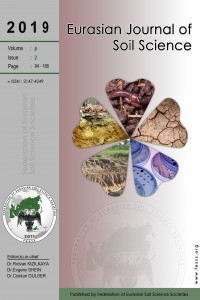
Eurasian Journal of Soil Science
Yazarlar: Botir KHAİTOV, Akhmad KURBONOV, Anvar ABDİEV, Maksud ADİLOV
Konular:Fen
DOI:10.18393/ejss.2016.2.105-112
Anahtar Kelimeler:Chickpea,Saline soil,Rhizobial strain,Nodulation and root colonization,Yield,Soil fertility
Özet: The growth, development and yield of chickpea ( Cicer ariеtinum L.) is strongly influenced by abiotic factors such as salinity and drought in the arid conditions. The use of efficient plant growth promoting bacteria in chickpea production is the best solution to overcome those stresses. In the present study, 10 chickpea rhizobial strains were isolated and purified from the nodules of chickpea genotype grown on middle salinated soils with different chickpea cultivation histories, 3 of them were more efficient in salt tolerance and showed higher nodulation abilities. Local chickpea genotype Uzbekistan-32 was inoculated with selected Rhizobium bacterial strains before planting them to the field condition. Inoculation of plants with strains Rhizobium sp. R4, R6 and R9 significantly increased shoot, root dry matter, and nodule number by 17, 12, and 20% above the uninoculated plants, respectively. The shoot length increased by 52%, root length by 43%, shoot dry weight by 36%, and root dry weight by 64%. Inoculation significantly increased the pod number by 28% and yield up to 55% as compared to control plant. The effective indigenous rhizobial strains isolated in this study from chickpeas on middle salinated soils of Uzbekistan have the characters of broad host range, high nodulation efficiency, efficient N fixation, great salt tolerance. Soil nitrogen, phosphorus and carbon content of the soil at the end of experiments were positive in all the treatments compare control. In this study, we are focused with consideration of the relationship between chickpea and its symbiotic nitrogen-fixing root nodule bacterial strains and how it functions to influence plant productivity and soil fertility.